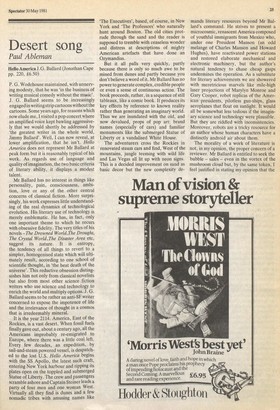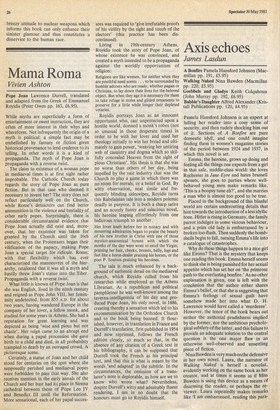Desert song
Paul Ableman
Hello America J.G. Ballard (Jonathan Cape pp. 220, £6.50) P. G. Wodehouse maintained, with unnerving modesty, that he was 'in the business of writing musical comedy without the music'. J. G. Ballard seems to be increasingly engaged in writing strip cartoons without the cartoons. Some years ago, for reasons which now elude me, I visited a pop concert where an amplified voice kept bawling aggressively that we would shortly be addressed by 'the greatest writer in the whole world, Jimmy Ballard'. Well, I can now reveal, at lower amplification, that he isn't. Hello America does not represent Mr Ballard at peak form but it is reasonably typical of his work. As regards use of language and quality of imagination, the two basic criteria of literary ability, it displays a modest talent.
Mr Ballard has no interest in things like personality, pain, consciousness, ambition, love or any of the other central concerns of classical fiction. More surprisingly, his work expresses little understanding of the real dynamics of technological evolution. His literary use of technology is merely emblematic. He has, in fact, only one important theme to which he recurs with obsessive fidelity. The very titles of his novels —The Drowned World,The Drought, The Crystal World ,The Disaster Area etc, suggest its nature. It is entropy, the tendency of all things to revert to a simpler, homogenised state which will ultimately result, according to one school of scientific thought, in 'the heat death of the universe'. This reductive obsession distinguishes him not only from classical novelists but also from most other science fiction writers who use science and technology to enrich the world and multiply options. J. G. Ballard seems to be rather an anti-SF writer concerned to expose the impotence of life and the irrelevance of thought in a cosmos that is irredeemably mineral. It is the year 2114. America, East of the Rockies, is a vast desert. When fossil fuels finally gave out, about a century ago, all the Americans improbably re-emigrated to Europe, where there was a little coal left. Every few decades, an expedition, by sail-and-steam powered vessel, is despatched to the lost U.S. Hello America begins with the SS Apollo, the latest such craft, entering New York harbour and ripping its plates open on the toppled and submerged Statue of Liberty. The crew and passengers scramble ashore and Captain Steiner leads a party of four men and one woman West. Virtually all they find is dunes and a few nomadic tribes with amusing names like 'The Executives', based, of course, in New York and 'The Professors' who naturally hunt around Boston. The old cities protrude through the sand and the reader is supposed to tremble with ceaseless wonder and distress at descriptions of mighty American artefacts that have done an Ozymandias.
But it all palls very quickly, partly because there is only so much awe to be mined from dunes and partly because you don't believe a word of it. Mr Ballard has no power to generate complex, credible people or even a sense of continuous action. The book proceeds, rather, in a sequence of still tableaux, like a comic book. It produces its key effects by reference to known reality rather than generating an imaginary world. Thus we are inundated with the old, and now devalued, props of pop art: brand names (especially of cars) and familiar monuments like the submerged Statue of Liberty or a vandalised White House.
The adventurers cross the Rockies in renovated steam cars and find, West of the mountains, jungle teeming with wild life and Las Vegas all lit up with neon signs. This is a decided improvement on sand as basic decor but the new complexity de mands literary resources beyond Mr Ballard's command. He strives to present a microcosmic, renascent America composed of youthful immigrants from Mexico who, under one President Manson (an odd melange of Charles Manson and Howard Hughes), have reactivated poWer stations and restored elaborate mechanical and electronic machinery, but the author's natural tendency to chase cheap gasps undermines the operation. As a substitute for literary achievements we are showered with meretricious marvels like mile-high laser projections of Marylyn Monroe and Gary Cooper, robot replicas of the American presidents, pilotless gun-ships, glass aeroplanes that float on sunlight. It would all be somewhat less tedious if the imaginary science and technology were plausible. But they are riddled with inconsistencies. Moreover, robots are a tricky resource for an author whose human characters have a distinctly android air about them.
The morality of a work of literature is not, in my opinion, the proper concern of a reviewer. Mr Ballard is entitled to seek the bubble — sales — even in the vortex of the mushroom cloud but, by the same token, I feel justified in stating my opinion that the breezy attitude to nuclear weapons which informs this book can only enhance their sinister glamour and thus constitutes a disservice to the human race.











































 Previous page
Previous page